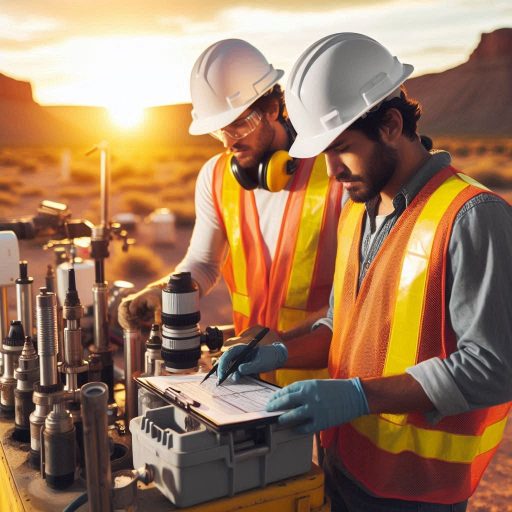Introduction
Continuing education is crucial for geological and petroleum technicians.
The industry constantly evolves, with new technologies and methods emerging regularly.
Staying updated ensures technicians remain valuable assets to their employers and maintain their expertise.
In this field, knowledge is power.
Technicians who commit to lifelong learning can adapt to changes more effectively.
They become more proficient in using advanced tools and technologies, which enhances their job performance.
Additionally, keeping up with industry trends allows technicians to anticipate shifts in the market, providing a competitive edge.
The petroleum and geological sectors are driven by innovation.
New drilling techniques, exploration methods, and data analysis tools are continuously developed.
Technicians who engage in continuing education are better equipped to integrate these advancements into their daily work.
This not only improves their efficiency but also contributes to the overall success of their projects.
Moreover, continuing education fosters professional growth.
Technicians who pursue additional training and certifications often qualify for more advanced roles.
This opens up opportunities for career progression and potentially higher salaries.
Employers value technicians who demonstrate a commitment to self-improvement, viewing them as motivated and forward-thinking professionals.
The rapid pace of change in geological and petroleum industries makes staying updated a necessity, not a luxury.
Without ongoing education, technicians risk falling behind, which can negatively impact their careers.
By investing time in learning, they ensure they remain relevant and capable in a competitive field.
The Benefits Of Continuing Education For Geological And Petroleum Technicians
How Ongoing Education Can Enhance Job Performance and Productivity
Ongoing education is a key factor in enhancing job performance and productivity for geological technicians.
By committing to continuous learning, technicians stay updated with the latest advancements and trends in their field.
This ongoing education allows them to adopt new techniques and technologies that can streamline their work processes.
For instance, learning about the latest geological mapping software enables technicians to analyze data more quickly and accurately.
This not only improves the quality of their work but also allows them to complete tasks more efficiently, leading to increased productivity.
Moreover, continuous education equips geological technicians with the skills to tackle more complex problems.
Advanced courses often emphasize critical thinking and problem-solving, which are essential in the ever-evolving field of geology.
When technicians are trained to approach challenges from multiple angles, they can develop innovative solutions that enhance project outcomes.
This ability to think critically and solve problems effectively boosts overall productivity, making these technicians valuable assets to their teams.
Potential for Career Advancement and Increased Earning Potential with Advanced Skills and Knowledge
Ongoing education is a key factor in enhancing job performance and productivity for geological technicians.
By committing to continuous learning, technicians stay updated with the latest advancements and trends in their field.
This ongoing education allows them to adopt new techniques and technologies that can streamline their work processes.
For instance, learning about the latest geological mapping software enables technicians to analyze data more quickly and accurately.
This not only improves the quality of their work but also allows them to complete tasks more efficiently, leading to increased productivity.
Moreover, continuous education equips geological technicians with the skills to tackle more complex problems.
Advanced courses often emphasize critical thinking and problem-solving, which are essential in the ever-evolving field of geology.
When technicians are trained to approach challenges from multiple angles, they can develop innovative solutions that enhance project outcomes.
This ability to think critically and solve problems effectively boosts overall productivity, making these technicians valuable assets to their teams.
Ongoing education doesn’t just improve day-to-day job performance—it also opens doors to career advancement and increased earning potential.
Geological technicians who invest in advanced skills and knowledge often find themselves qualifying for higher-level positions within their organizations.
For example, a technician who specializes in environmental geology or hydrogeology through further education may become eligible for roles involving project management or specialized consulting.
Read: CAD Technician Salary: What to Expect in the USA
Types of continuing education options available
Traditional Options Such as Workshops, Seminars, and Conferences
Continuing education is crucial for geological and petroleum technicians who want to stay competitive in the industry.
Traditional options like workshops, seminars, and conferences offer valuable opportunities for skill development and professional growth.
These in-person events provide an environment where technicians can directly engage with industry experts, participate in hands-on activities, and gain insights into the latest technological advancements.
Workshops are particularly beneficial for those seeking to deepen their knowledge in specific areas.
These focused sessions often involve practical, hands-on training that helps technicians master particular skills quickly.
Whether it’s a new software tool or a specialized technique in geological analysis, workshops provide intensive, short-term training that can be immediately applied in the workplace.
Online Courses, Certifications, and Degree Programs That Can Be Pursued While Working
While traditional educational options are invaluable, online courses, certifications, and degree programs have revolutionized continuing education for geological and petroleum technicians.
These options provide unparalleled flexibility, allowing technicians to further their education without disrupting their current work schedules.
Online courses are particularly popular because they offer the convenience of learning at one’s own pace.
Platforms such as Coursera, Udemy, and edX provide courses in geology, petroleum engineering, and related fields, covering everything from fundamental principles to advanced techniques.
These courses are often taught by experts from top universities and industry leaders, ensuring that the content is both relevant and high-quality.
In addition to individual courses, online certifications provide a more structured path for professional development.
Earning a certification demonstrates a technician’s commitment to their field and can significantly enhance their resume.
Certifications in specialized areas, such as petroleum technology or environmental geology, signal to employers that a technician has the expertise and dedication needed to excel in these specific roles.
Read: Top CAD Software for Aspiring CAD Technicians
Industry-specific resources for continuing education
Reputable Organizations and Associations Offering Continuing Education
To support ongoing education, many reputable organizations and associations offer continuing education opportunities for geological and petroleum technicians. Here are a few notable ones:
- American Association of Petroleum Geologists (AAPG): AAPG offers various professional development courses,
webinars, and certification programs for petroleum and geological technicians.
These programs cover a wide range of topics, from exploration techniques to environmental regulations. - Society of Exploration Geophysicists (SEG): SEG provides continuing education through online courses, workshops, and conferences.
These programs focus on geophysical methods, data analysis, and other relevant skills essential for geological technicians. - National Ground Water Association (NGWA): NGWA offers courses and certifications specifically for hydrogeology and groundwater management.
These programs are designed to enhance technical skills and keep technicians informed about the latest industry practices. - Geological Society of America (GSA): GSA provides a variety of educational resources, including webinars, field trips, and workshops.
These opportunities are designed to help geological technicians stay current with advancements in the field. - Petroleum Technology Transfer Council (PTTC): PTTC offers training programs and workshops aimed at improving the skills and knowledge of petroleum technicians.
These programs focus on the latest technological developments and best practices in the industry.
Professional Development Programs and Resources
In addition to formal education programs, professional development opportunities are available through industry publications and websites.
Many websites offer articles, case studies, and research papers that provide valuable insights into the latest trends and technologies.
Subscribing to industry journals and magazines can help technicians stay informed and continually improve their skills.
Websites like OnePetro and GeoScienceWorld provide access to a vast collection of technical papers and research materials.
These resources are invaluable for technicians looking to deepen their understanding of specific topics.
Additionally, many industry websites offer forums and communities where professionals can exchange ideas and learn from one another.
By taking advantage of these educational opportunities, geological technicians can continuously enhance their skills, improve job performance, and increase their potential for career advancement.
Read: How to Become a CAD Technician: Step-by-Step Guide

Case studies of successful geological and petroleum technicians who have benefited from continuing education
Stories of individuals who have advanced their careers through ongoing education
Consider the story of Sarah, a petroleum technician who felt stagnant in her role.
She decided to enroll in an online certification course focused on advanced drilling techniques.
This decision transformed her career.
Within a year, Sarah was promoted to a supervisory position, where she now oversees complex drilling operations.
Another example is Michael, a geological technician who attended several industry conferences and workshops over the years.
These events not only expanded his technical skills but also broadened his professional network.
Michael’s continued education and networking led to a role as a senior geologist at a major energy company.
Specific skills and knowledge they acquired and how it positively impacted their work
Sarah’s advanced drilling course provided her with up-to-date knowledge on the latest technologies and techniques, enabling her to streamline operations and increase efficiency.
Her newly acquired skills also gave her the confidence to take on more responsibility, leading to her promotion.
Michael’s participation in workshops and conferences equipped him with cutting-edge geological analysis methods, which he applied to improve resource assessment processes at his company.
His dedication to staying current with industry trends made him an invaluable asset to his team and positioned him for leadership.
Continuing education through traditional and online options can lead to career advancement and increased job security.
Technicians who stay current with industry trends and technologies are more likely to be considered for promotions and leadership roles.
Additionally, continuing education can lead to higher salaries, as employers value employees who invest in their professional development.
In an industry as dynamic as geological and petroleum technology, staying up-to-date is essential for long-term success.
Generally, whether through traditional workshops, seminars, and conferences, or online courses, certifications, and degree programs, continuing education is vital for geological and petroleum technicians.
These educational opportunities enhance skills and knowledge and open doors to new career opportunities and increased earning potential.
Stories like those of Sarah and Michael illustrate how ongoing education can positively impact technicians’ careers.
Investing in continuing education is a smart move for any technician looking to advance in this competitive field.
Read: Surveying and Mapping Technician Internships: A Guide
Tips for balancing continuing education with work
Strategies for managing time effectively to pursue further education while maintaining a full-time job.
Balancing full-time work with further education can be challenging but manageable with the right strategies.
Start by creating a detailed schedule that allocates specific times for studying and attending classes.
Prioritize tasks and use time management tools like calendars or apps to stay organized.
Breaking down larger tasks into smaller, manageable chunks can make the workload seem less overwhelming.
Communicate with your employer about your educational goals; they may offer support or flexible hours.
Additionally, setting aside dedicated time each week for coursework or study can help maintain consistency without disrupting work responsibilities.
Importance of setting goals and priorities when deciding on continuing education opportunities
Setting clear goals and priorities is crucial when pursuing continuing education.
Begin by assessing your career objectives and identifying the skills or knowledge you need to achieve them.
Research different educational options to find those that align with your goals.
For instance, if you aim to specialize in a new technology, seek workshops or courses focusing on that area.
Setting specific, measurable goals helps in evaluating the effectiveness of the education and ensures you stay focused.
Prioritizing your educational pursuits based on their relevance to your career objectives will help you make informed decisions and invest your time and resources wisely.
Online courses, certifications, and degree programs that can be pursued while working.
Online courses have become a flexible option for continuing education, allowing technicians to learn at their own pace.
Platforms like Coursera, Udemy, and edX offer courses in geology, petroleum engineering, and related fields.
These courses cover a range of topics, from basic concepts to advanced techniques, providing valuable knowledge that can be applied directly to your job.
Online certifications are another option, offering credentials that can boost your resume and demonstrate your commitment to professional development.
For those looking to further their education while working, online degree programs are an excellent choice.
Many universities offer online or hybrid degree programs in geology, petroleum engineering, and related fields.
These programs are designed with working professionals in mind, offering flexible scheduling and the ability to complete coursework remotely.
Earning a degree online allows you to advance your education without leaving your current job, balancing your career with academic growth.
Conclusion
Continuing education is vital for geological and petroleum technicians.
Staying updated with industry advancements ensures you remain competitive in a rapidly evolving field.
As technology advances and new methods emerge, professionals must continuously enhance their skills to maintain relevance.
Regularly updating your knowledge base not only improves job performance but also opens doors to new opportunities.
Investing in your professional development is a proactive step towards long-term career success.
By staying current, you can adapt to changes, meet industry demands, and solve complex challenges more effectively.
Additionally, continuing education helps you stay informed about the latest regulations, safety standards, and best practices.
This awareness is crucial for maintaining high work standards and ensuring compliance in your operations.
Beyond technical skills, continuous learning fosters critical thinking and problem-solving abilities.
It also encourages innovation, allowing you to contribute fresh ideas to your team and organization.
Employers value technicians who are committed to their growth and can bring new perspectives to the table.
By taking charge of your education, you demonstrate a strong work ethic and a dedication to excellence.
[E-Books for Sale]
The Big Book of 500 High-Paying Jobs in America: Unlock Your Earning Potential
$19.99 • 500 High-Paying Jobs • 330 pages
Explore 500 high-paying jobs in America and learn how to boost your career, earn more, and achieve success!
See All 500 High-Paying Jobs of this E-Book
1001 Professions Without a Degree: High-Paying American Jobs You Can Start Now
$19.99 • 1001 Professions Without a Degree • 174 pages
Discover 1001 high-paying jobs without a degree! Unlock career tips, skills, and success strategies for just $19.99!




